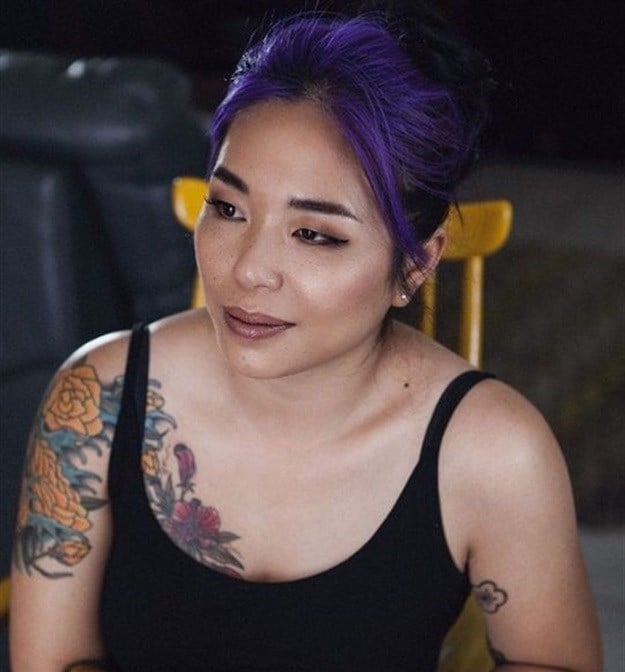#FairnessFirst: How to avoid cultural appropriation in advertising

On Friday, 27 July, Creative Mornings Cape Town hosted their latest inspirational monthly morning talk, at the Friends of Design space on Bree Street. The topic was ‘intention’, with males were a rare breed at this creative edition, with the room positively packed with females.
Maybe that’s because there were fangirls in abundance to hear from Lin, founder of the Butterfingers food blog and the #JustAddRice cookbook. Lin explained that her family emigrated to SA from Taiwan when she was three-years-old, as one of the first waves of Taiwanese immigrants to our shores.
Unfortunately, the exotic is not always understood, as Lin says she doesn’t even roll her eyes anymore when people say, “Oh, I love Thai food,” when she shares her origin story.
The distance from Thailand to Taiwan is roughly that of South Africa to Madagascar. Think of your own irritation when the ‘Africa as a country’ line comes up, and you’ll have a slight understanding of Lin’s annoyance.
She’s not one to stew in silence, though. Far from it, Lin uses her social media following to share her experiences with others. In doing so, she’s helping others learn what’s really going on in the world – and hopefully also unlearn the stereotypical thinking we blindly follow.
She uses her experience to educate others. For example on 1 August, the day of the #TotalShutdown Women’s March, she posted the following:
Sometimes a picture (and caption) really does have the power to evoke change.
Further explaining her perspective, Lin shared at the Creative Mornings session that she grew up in a middle-class family in a "very white space" in Bloemfontein. She may have been a minority, but acknowledges she was still privileged (especially in terms of access to education), but that doesn’t mean her childhood was easy.
Lack of understanding turns ‘otherness’ into racism
Instead, she describes it as “an interesting experience,” as she was the only Asian child in her school year for the first few years, which was also the basis of her learning about racism.
Her first memory of racism? Having her mom pack kimbap in a lunchbox for school, which led to bullying as her lunch “looked different and smelled weird”. Lin says, “I will never understand what it’s like to be black, and that [particular form of racism] is whole other form of oppression, but we do need to take the step in acknowledging that we simply can’t relate to that experience.”
The fact that she was different from the rest made Lin a target for ‘othering’, which Lin says made her assimilate to both societal norms and her own culture as she didn’t want to be bullied for being seen as a stereotype.
I was never seen as my own personality – a feminist, a tomboy; just that I was Asian.Of the experience, Lin says it’s almost as though her true character was stripped away. As a result, you assimilate with society to survive.
Lin says this, in turn, is problematic as the child of first-generation migrants so it makes you a ‘third-culture child, where you grow up not really belonging to either your parents’ culture or that of your peers. Instead, you are your own culture.
Lin has become a bit of an icon for that as a result.
But that’s part of what pushed her to promote women empowerment when she went on to become founder of the Cape Town Rollergirls NPO, serving as its marketing and PR chair for four years.
She spoke of the deep physical scars that result from gravel getting stuck in your skin. It’s about more than zooming around on wheels though, as the resulting women’s roller derby league creates a sense of community in a space where women don’t get enough of it and, and the opportunity to keep encouraging and uplifting others.
Not one to do things half-heartedly, Lin dived in with a patisserie short course, started her Butterfingers food blog as a way to note down family-favourite recipes, which led to her book, Just Add Rice.
Stereotyping: Intention vs. impact vs. effect
Background dusted, Lin spoke of intent versus the effect of stereotyping in the media.
Stereotyping obviously played a big role in Lin’s life, and as creatives, we are responsible for what the general public sees in the media. When it comes to advertising, the intention is to sell, but stereotyping is where it goes wrong.
That’s why Lin has focused on ‘othering’ and the effect of this on minorities. Based on her own experience in advertising, she has taken to successfully calling out brands who may not realise that their messaging is harmful, whether through playing to the stereotypical tropes we’ve come to expect, or cultural appropriation.
She shared four examples of this.
1: First up was Telkom, with their Chinese New Year campaign that promoted its deals with the wording ‘Be a sensei of saving’ and ‘karate chop savings’.
While these may seem ‘punny’ and even clever to those not from Asia, if you are Asian, you’ll know sensei is a Japanese word, so the phrasing was not at all fitting as a spinoff of Chinese New Year. This may not be particularly offensive, but in the South African context, Chinese locals were classified under ‘coloured’ while the Japanese had white privileges during apartheid, due to the country’s trade relations. So it's particularly cringe-worthy if you’re part of the culture affected.
On how these mistakes happen, Lin says the onus is on creatives to stop and think. It’s not enough to just create a concept, bounce it off your internal team and roll it out to media.
Without the proper research, it’s this type of messaging that further perpetuates stereotypes and misinformation in society. As consumers, we also have a role to play in calling brands out.
Lin did so, and Telkom sent a tweet of apology, then changed the campaign messaging.
Dear @TelkomZA. Sensei means teacher in Japanese. Why are you mixing Japanese culture to celebrate #ChineseNewYear? This makes no sense. Please stop using East Asian culture to sell if/when you can't even make the effort to understand it. pic.twitter.com/TZYRvrNjX5
— Ming Chows 林明巧�� (@mingcheau) February 12, 2018
2. Lin’s next example was a positive of what brands can do, with the Jimmy Nevis ‘Not Made in China’ concept. To a local, the idea may make sense in terms of comparing local products to the mass-produced and fake labels, but don’t forget there’s demand for cheaper products by people who live in poverty and can’t afford big brand labels.
When Lin called him out on this, Nevis responded that he would change the campaign, and showed his human side.
@JimmyNevis Probably not your intention bt I don't find this very tasteful to push local craft. Perpetuates only fake stuff come frm China �� pic.twitter.com/kVrB74L5ro
— Ming Chows 林明巧�� (@mingcheau) July 2, 2017
3. Then we come to Simply Asia, which may seem to have cool packaging from an outsider perspective, but from a cultural perspective, Lin explains that sticking chopsticks in a bowl symbolises death. That’s a big taboo ‘no no’, but this was rolled out on all their packaging. The account manager and client okayed it, and Lin says, “Little did they know, so little did they research.”
She called them out on this and they said they would change the packaging – unfortunately, their new packaging was along the same lines as a new team was in place by then, but they did later apologise.
4. In a final example of how she has used what she calls her ‘privilege and accessibility in the media to transform’, Lin shares the example of the Asian fusion restaurant that launched in Johannesburg last year, called ‘Miso Hawni’, with the additional ‘punny Asian’ slogan of ‘Ramen, amen’.
For someone like Lin, who has experienced everything from the casual catcall to full-on harassment, news of the name invoked awful memories. She explained:
The bodies and faces of Vietnamese women were exoticised as they did what they had to do to survive during WWII. Unfortunately, this was then normalised.When Lin called the owners out on this, they initially responded on Jacaranda FM with a defence along the lines of: “Not everyone will like our name.” Unfortunately for them, Lin’s tweet went viral across the globe.
A new 'Asian' restaurant opening in Joburg, owned by non Asians. It covers 3 different cultures: 1.ramen (Japanese), 2.poke (Hawaiian) & 3.Korean BBQ. As an Asian woman, I really hate the name. It might seem funny but when men say it while they sexually harass you it's not. pic.twitter.com/gAVDiSKFah
— Ming Chows 林明巧�� (@mingcheau) November 14, 2017
Mindfulness and cultural appropriation
This boils down to cultural appropriation, which is where we take a culture not our own and link anything that seems relevant (in this case, Asian) to cobble together a concept. But the fact that it’s not your culture means there’s an inherent lack of respect to do the proper research.
That’s why Lin says we need to school our friends on this to spread the message as the sequence of othering is usually a whole chain effect and we can’t place the blame on just one person.
It’s a sad reality that is so normalised across the world, but it starts with us. Those of us who work in advertising need to unlearn what we’ve been taught, unpack all that baggage and go forward.
Lin says we exercise our bodies to stay fit and need to do the same with our minds. We need to make a conscious decision to keep learning and also acknowledge that we don’t know it all.
Be mindful, as South Africa’s demographics are made up of 96% people of colour, which is not represented in advertising. This needs to be acknowledged, as race has affected everyone in some way.
Wow. The levels of cultural appropriation out there! Brands and individuals have to be careful. Do research through all of your phases. Something witty isn’t necessarily correct. Thank you @mingcheau for enlightening us ���� #creativemornings
— Grant McPherson (@grant_mcp) July 27, 2018
Social media become an echo chamber of our own likes and beliefs, so we need to stretch ourselves to feel uncomfortable, then learn what else is out there and challenge ourselves.
We need to then educate others and acknowledge that we don’t know more than those who have experienced what they have experienced.
Lin says following people different to you on Twitter and seeing their perspective, the intention vs impact vs effect is a good way to relearn.
Listening to @mingcheau during @CapeTown_CM was such a (mindfully kind) kick in the gut about cultural appropriation & “otherness”. She IS the change we want to see in the world, go Ming! #girlpower #learn #unlearn #dialogue
— iMarieza van Zyl (@Mariezavz) July 27, 2018
Follow Ming-Cheau on LinkedIn, Twitter, Facebook and Instagram, and be sure to visit her Butterfingers food blog, and keep an eye on the Creative Mornings CT Twitter feed for the latest updates.
Read more





































